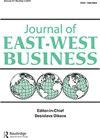欧元同业拆借利率对东南欧经济体的溢出效应:一个全球VAR方法
IF 0.9
Q4 BUSINESS
引用次数: 5
摘要
在本文中,我们采用全球向量自回归模型(G-VAR)来研究2002-2016年期间东南欧国家的宏观经济和国际货币溢出效应。我们特别研究了Euribor的冲击如何影响六个国家的国内利率、实际有效汇率、外汇储备和工业生产,即保加利亚、克罗地亚、希腊、北马其顿、罗马尼亚和斯洛文尼亚,使用月度数据。我们的分析表明,欧元同业拆借利率的负冲击对各国的工业生产有积极影响,但影响程度不同。关于Euribor对外汇储备、利率和实际有效汇率的影响,证据有限。我们的研究结果为当局和政策制定者提供了重要的启示和见解。本文章由计算机程序翻译,如有差异,请以英文原文为准。
The Spillover Effect of Euribor on Southeastern European Economies: A Global VAR Approach
Abstract In this paper we employ a Global Vector Autoregressive Model (G-VAR) to examine macroeconomic and international monetary spillovers within the South Eastern European Countries over the period 2002–2016. In particular, we investigate how shocks in Euribor affect domestic interest rates, real effective exchange rates, foreign exchange reserves and the industrial production in six countries, namely Bulgaria, Croatia, Greece, North Macedonia, Romania and Slovenia, using monthly data. Our analysis shows that a negative Euribor shock has a positive effect, but of different size, on the industrial production across the countries. There is limited evidence regarding the effects of Euribor on foreign reserves, interest rates, and the real effective exchange rate. Our results provide significant implications and insights for authorities and policy makers.
求助全文
通过发布文献求助,成功后即可免费获取论文全文。
去求助
来源期刊

Journal of East-West Business
BUSINESS-
CiteScore
2.10
自引率
26.70%
发文量
19
期刊介绍:
Journal of East-West Business is a quarterly journal that deals with contemporary and emerging aspects of business studies, strategies, development, and practice as they relate to the Russian Federation, the new republics of the Commonwealth of Independent States, and Eastern/Central Europe-and business relationships with other countries of the world. The Journal of East-West Business is international in scope and treats business issues from comparative, cross-cultural, and cross-national perspectives. The journal features an Editorial Advisory Board that represents the Russian Federation, Eastern/Central European, and Baltic states in this new business arena.
 求助内容:
求助内容: 应助结果提醒方式:
应助结果提醒方式:


